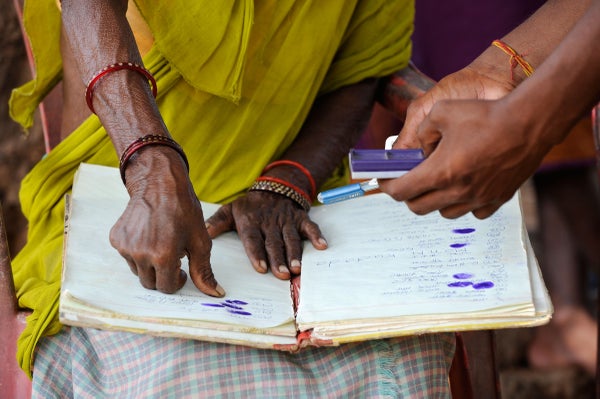On October 8, 2020, Indian authorities arrested Stan Swamy, an 83-year-old Jesuit priest affected by Parkinson’s disease, from his home in the state of Jharkhand. Swamy is being held under an antiterrorism law, the Unlawful Activities Prevention Act (UAPA), that a group of United Nations’ Special Rapporteurs has condemned for enabling the Indian state to designate dissidents as terrorists and detain them for months without access to courts. Swamy joins dozens of other prominent individuals—lawyers, writers, academics, journalists, poets, performers and others—who have also been arrested and charged under UAPA for inciting mob violence, links with Maoist insurgents, and other serious crimes. Virtually all are advocates of human rights, especially those of Adivasis (Indigenous peoples) and Dalits (members of oppressed castes).
Since the early 1990s, Swamy has been assisting Adivasis in the state of Jharkhand who face persecution for opposing the forcible acquisition of land on behalf of mining companies. Although Adivasis are the poorest of Indians, the regions they inhabit are the richest in natural resources. This wealth has become their curse. The setting up of mines, industries, power plants and dams in the remote regions that Adivasis traditionally inhabit has resulted in an enormous loss of forest and biodiversity, as well as in the fragility of ecosystems and the pollution of air and water.
The Adivasis’ plight has become especially dire since 1991, when India initiated neoliberal economic reforms and began to attract investment to mineral-rich areas on terms favorable to industrialists and violative of Indigenous rights. With formerly productive fields turned into expanses of mining waste and rivers and streams either drying up or poisoned with effluents, millions of Adivasis were forced to leave their homes to seek livelihoods in distant urban areas. In 2014, when I chaired a governmental committee on the socioeconomic status of India’s tribal communities, we documented that although Adivasis comprise only 8 percent of Indians, they are four times more likely to be displaced by such development—despite special provisions in the Indian Constitution and other laws for protecting their rights.
On supporting science journalism
If you're enjoying this article, consider supporting our award-winning journalism by subscribing. By purchasing a subscription you are helping to ensure the future of impactful stories about the discoveries and ideas shaping our world today.
The Fifth Schedule of the Indian Constitution provides for a special system of administration in areas where Adivasis predominate. The governors of so-called schedule states, of which Jharkhand is one, are equipped with councils to advise on tribal issues; they also have special executive powers to repeal or amend any acts or laws that have an adverse bearing on Adivasis. Other important national laws ensure the rights of Adivasis to govern themselves and to protect their land and forest from alienation. Successive governments have not only failed to implement these constitutional provisions and laws; they have also ignored a 1997 Supreme Court judgment asserting that the owner of a plot of land is also the owner of all subsoil minerals. To the contrary, the Indian state has repeatedly resorted to the British colonial concept of “eminent domain,” which holds that the sovereign has the right to all land, to seize it from Adivasis and hand it over to corporate houses.
Adivasis have no option but to fight for survival. Their nonviolent struggles seek to ensure that the constitutional provisions, laws, rules, regulations and court orders that protect their rights are enforced. To this end, they have conducted protest rallies and filed lawsuits in courts—to which initiatives the national and state governments have responded with violence. Since Maoists, who are in conflict with the Indian state, have a strong presence in schedule areas, the Indian nation has taken to branding all social movements and even assertations of constitutional and legal rights as antinational and Maoist.
Protesters have invariably been booked under draconian laws and kept in detention without trial for years. The organization that Swamy founded, Bagaicha, found 3,000 such Adivasi prisoners in Jharkhand alone in 2016, and concluded that 97 percent of those charged as Maoists were innocent of that offense. Bagaicha’s report quoted a saying attributed to the Scythian philosopher Anacharsis but profoundly descriptive of the relationship of Adivasis with the legal system: “Written laws are like a spider-web, it will trap the poor and the weak, but it will be torn to pieces by the rich and powerful.”
Swamy and the fiery lawyer Sudha Bharadwaj, who was working in the state of Chhattisgarh and has been held under UAPA for two years now, were assisting Adivasi prisoners in obtaining speedier trials and representation in court. The government has invariably regarded the advocates for Adivasis as adversaries and used intimidation and coercive measures to stop their work. Never before, however, has it imprisoned so many prominent human-rights defenders at the same time. In late November, V. S. Krishna, who was helping 11 Adivasi women obtain justice for alleged rapes by anti-Maoist paramilitary forces, was also charged under UAPA, as well as with sedition—which potentially carries a sentence of life imprisonment.
As an Adivasi, I feel deeply anguished at the way that we and our allies are being treated by the Indian state. Our struggle for securing access to land, forest, water and other resources dates back to the colonial period. We had hoped for better times in independent India, with its progressive constitution that, we believed, secured our rights. This hope has been belied, and Adivasis have no option but to continue with our just struggle. But every act of resistance, no matter how peaceful or constitutional, is being met with extreme violence that the Indian government is hoping will escape wider scrutiny. That is why the government acts so brutally against those who defend the right of Adivasis to defend the environment—and why such repression deserves the world’s attention.
